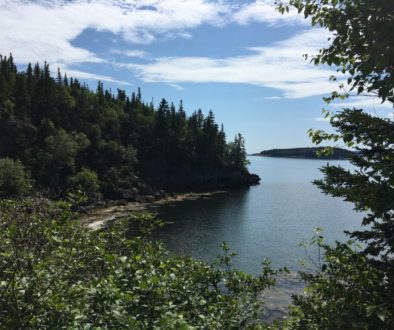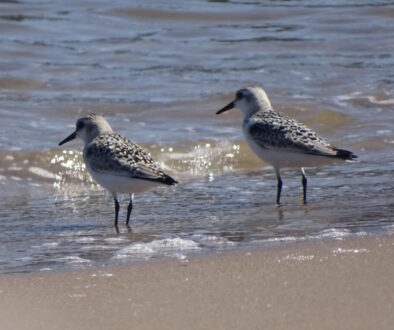Groups join with scientists and academics to call for new Crown Lands and Forests Act
FREDERICTON — A broad range of public interest groups and experts in New Brunswick says new legislation is needed to ensure our public forests are being managed to meet the needs of all New Brunswickers.
The group, which includes representatives from wildlife organizations, the scientific community, private woodlot owners, environmental and conservation organizations, is calling for the urgent development of a new Crown Lands and Forests Act.
In a statement sent to the provincial government today, the group says the existing act, which came into law in 1982, fosters an outdated approach to forest management and fails to reflect the interests of the whole province. Forest management has become more complex, and New Brunswickers now expect forests to be managed for water, wildlife, recreation and other uses as well as jobs and revenue.
The statement referenced Auditor General Kim MacPherson’s June 2015 report on forest management, which stated our public forest should be managed for economic, environmental and social values, and highlighted that the province has lost money from the management of public forests for at least the last five years.
The group says new forest legislation should:
(1) State clear principles for managing public forests to protect the range of life in the forest, nature’s benefits, a wide variety of sustainable, forest-based business opportunities and recreational values all in the context of climate change;
(2) Clarify and reinstate government as the trustee responsible to the public for the stewardship of Crown lands;
(3) Ensure transparency in setting forestry goals and objectives, and in achieving them, including a robust system of public involvement and consultation throughout the process;
(4) Respect the Peace and Friendship Treaties and establish mechanisms for consultation through free, prior and informed consent with indigenous peoples;
(5) Support diversification and value-added processing within New Brunswick’s forest products sector; and
(6) Ensure that private woodlots provide a proportional share of the wood supply and promote productivity from private woodlots through stronger management, pricing and marketing measures.
Read the group’s statement and background information here.
-30-
“Our membership is convinced that opening more conservation land to harvesting of trees in sensitive, stream buffers could endanger vulnerable Atlantic salmon populations by damaging the habitats upon which they depend. It is appalling that such a sweeping change to the forest management regime was forced upon us without any discussion with the concerned watershed groups and conservation groups. We have deepened our commitment to work cooperatively with the provincial government, First Nations, the forest industry, scientists, conservation organizations and other interest groups to better manage our Crown resources,” said Debbie Norton, President of NB Salmon Council.
“What’s really significant here is the broad range of people who are coming together and saying, ‘this act doesn’t work for us anymore — it doesn’t work for the good of the province’. Our forests are very special to New Brunswickers, so when this many people and different types of experts are saying something is broken, it’s time to fix it,” said Lois Corbett, Executive Director of the Conservation Council of New Brunswick.
“Naturalists from across New Brunswick are very concerned about the lack of attention the province pays to wildlife and habitat in our public forests. We see the consequences of this every day, we are ready to work with government in developing a new act that better protects New Brunswick nature,” said Vanessa Roy-McDougall, Executive Director of Nature NB.
“New Brunswick lags behind all provinces in Canada except P.E.I. when it comes to protecting natural areas on Crown land. New legislation should create new rules that allow us to conserve resilient forests and native biodiversity in light of climate change, and support a wider range of forest-based businesses,” said Roberta Clowater, Executive Director of Canadians Parks and Wilderness Society – NB Chapter.
“The fundamental flaw in the 1982 act is that industrial consumers of wood were made managers of crown land and not customers; there are conflicts of interest that can only be resolved by creating a new Act. Woodlot owners believe that the people harvesting Crown wood should have a common interest with us in getting fair market value for logs and other forest products. It is time to correct the mistakes of the past for the good of all N.B.,” said Andrew Clark of the New Brunswick Federation of Woodlot Owners.
“The New Brunswick Wildlife Federation supports the use of public forests in the province to provide a variety of social and economic benefits. However, those uses should not compromise the integrity of natural habitats and biodiversity,” said Charles LeBlanc, President of the New Brunswick Wildlife Federation.
For more information or to arrange an interview, contact:
Jon MacNeill, Conservation Council of New Brunswick: 458-8747 | 261-1353 | jon.macneill@conservationcouncil.ca
Sabine Dietz, Nature NB: 536-1260 | 536-7560 | sabine.dietz@bellaliant.net (bilingual)
Andrew Clark, New Brunswick Federation of Woodlot Owners: 459-2990 | 324-3380 | andrewclark@xplornet.com
Peter J Cronin, NB Salmon Council: 444-9012 | 238-4616 | pjcronin18@gmail.com
Roberta Clowater, Canadian Parks and Wilderness Society, NB Chapter: 452-9902 | 449-5106 | rclowater@cpaws.org
Rod Currie, New Brunswick Wildlife Federation: 458-5643 | racurrie@nb.sympatico.ca
An interview with Roberta Clowater and Lois Corbett can be found here.


